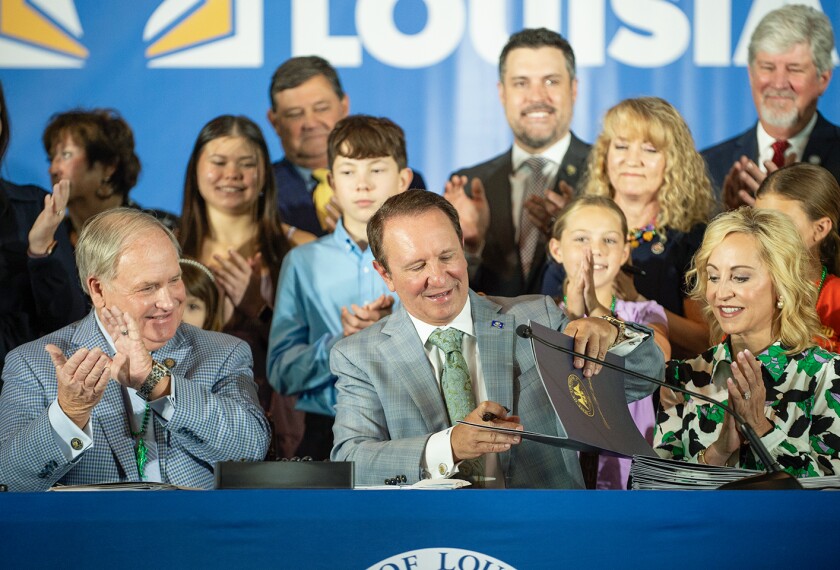The Oklahoma Supreme Court on Tuesday ruled that the plan for a religious charter school that would receive state funds but be controlled by two Roman Catholic dioceses in the state violated the state and federal constitutions.
The court voted 6-2 against the St. Isidore of Seville Catholic Virtual School, sponsored by the Catholic Archdiocese of Oklahoma City and Diocese of Tulsa, which was set to begin its contract on July 1 with some 400 to 500 students and receiving some $2.5 million in state education aid in its first year.
“Although a public charter school, St. Isidore is an instrument of the Catholic church, operated by the Catholic church, and will further the evangelizing mission of the Catholic church in its educational programs,” Justice James R. Winchester wrote for the majority in explaining why the religious charter would violate a state constitutional provision that bars the state from using public money for the benefit or support of any religious institution.
“Enforcing the St. Isidore contract would create a slippery slope and what the [state constitutional] framers warned against—the destruction of Oklahomans’ freedom to practice religion without fear of governmental intervention,” Winchester said.
The state’s highest court went on to hold that the religious charter school would be a “state actor” and not a private entity contracting with the state. And it would violate the U.S. Constitution’s First Amendment prohibition on government establishment of religion.
“St. Isidore will fully incorporate Catholic teachings into every aspect of the school, including its curriculum and co-curricular activities,” Winchester said. “It will require students to spend time in religious instruction and activities, as well as permit state spending in direct support of the religious curriculum and activities within St. Isidore—all in violation of the establishment clause.”
The court further rejected a central argument advanced by St. Isidore supporters, that recent U.S. Supreme Court cases removing barriers to the inclusion of religious private schools in state aid programs gave St. Isidore and the families that would enroll a First Amendment free exercise of religion right for the charter school to be funded by the state.
“What St. Isidore requests from this court is beyond the fair treatment of a private religious institution in receiving a generally available benefit, implicating the free exercise clause,” Winchester said. “It is about the state’s creation and funding of a new religious institution violating the establishment clause.”
A possible appeal to the U.S. Supreme Court?
The decision was a victory for Oklahoma Attorney General Gentner Drummond, a Republican who had differed with his predecessor on the legality of a religious charter school. Drummond had filed the case asking the state supreme court to invalidate the approval last year of the St. Isidore charter by the Statewide Virtual Charter School Board.
“This decision is a tremendous victory for religious liberty,” Drummond, who had argued the case and warned that approval of St. Isidore might lead to all manner of religious charters, such as a Satanism school, said in a statement. “I hope that the people of Oklahoma can rejoice that they will not be compelled to fund radical religious schools that violate their faith.”
John Meisner, the director of the Religious Liberty Clinic at Notre Dame Law School, which is helping to represent St. Isidore, said in a statement, “St. Isidore is considering its legal options but today’s decision to condone unconstitutional discrimination against religious educators and the children they serve is one that the school will continue to fight. St. Isidore merely seeks to join Oklahoma’s diverse array of charter schools, bringing educational choice and opportunity to communities and families in need.”
Because the case involves federal constitutional issues, it is possible supporters of St. Isidore could ask the U.S. Supreme Court to intervene.
Dustin P. Rowe, the vice chief justice of the Oklahoma high court, issued a short opinion stating that he agreed with the majority that a provision of the state constitution mandates that charter schools be nonsectarian. But he dissented from the rest of the majority opinion.
Justice Dana Kuehn dissented on every issue discussed by the majority.
“St. Isidore would not become a ‘state actor’ merely by contracting with the state to provide a choice in educational opportunities,” she said. “By allowing St. Isidore to operate a virtual charter school, the state would not be establishing, aiding, or favoring any particular religious organization. To the contrary: Excluding private entities from contracting for functions, based solely on religious affiliation, would violate the free exercise clause of the First Amendment.”






